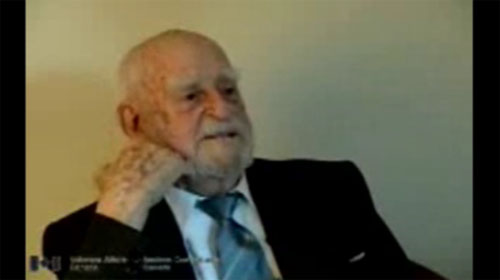Oh it’s very exhilarating. As a matter of fact, this particular
little group that I belonged to all immediately went AWOL,
jumped on a train with these false passes and railroad warrants
and went up to London. And celebrated up there to the extent,
with the rest of the troops from all over the world - Australians
New Zealanders, South Africans, Canadians, Americans,
celebrated in London and the Nelson’s Monument had, was
surrounded by large boards on which they had various pictures
encouraging people to either be economizing something or picture
of Kitchener with his finger pointed, “The country needs you,”
you see. So the troops put up, imagine putting up with that
during the war. But the moment armistice was signed, we all
headed for London, and I guess most of us got a little drunk.
As a matter of fact, I think it was the first time in my life I’d
ever got drunk. I got, majority got carried away. I won’t, don’t
know where I was in the thing, but the fire department came
out and turned the hose on us and squashed a lot of that.
Interviewer: After 4 long years the war was over. Did you have
any thoughts about where and what you were going to do then?
Well, I wanted to do, wanted to do something. I didn’t know what
I wanted to do and money was extremely sparse and I went to
night school, for which I payed a noble sum of three dollars a
month and I took up bookkeeping, basically. And I studied a bit
of English myself, you know books and that sort of thing.
And I worked at various, I wouldn’t like to call them enterprises
but various things that would give me a little money. I would
clerk in a store. I would work in a restaurant washing dishes.
You’d get some free food that way you know. Sell calendars, sell
magazines, even improved to the stage where I sold insurance.
Dug ditches, in Parliament building, you already said you’re
familiar with Ottawa. Some interesting things. Following,
arriving in Ottawa the next day, you know, what am I going
to do? I’m still in the army, but I’ve got to live for two weeks
and I can’t do it on five dollars very well. Even though you
could get a very good meal for 25 cents. I got a job in the
Hunter building as a labourer. So, of course, I had no one to
prepare a lunch for me or a lunch pail or anything like that.
So in those days they used to blow a whistle to stop work,
you know, you may be familiar with it. So when the the whistle
blew I went to a local restaurant for a meal and I came back.
A man came up to me he says, “Give me two dollar.”
Well, we were pretty crude and hard boiled at that time.
"I’ll give you a poke in the goddamn teeth, that’s what I’ll
give you." And I think with that, the whistle blew and get on
with our work. The next day was a repeat. So I was getting
a carpenter some board or something I don’t a window frame
or whatever and I said to him, “That man over there that’s
pushing the wheelbarrow. He keeps bugging me for two dollars.
What the hell is the matter with him?” Now I might as well told
the man I had aids or leprosy or something because he says to me,
“Are you a goddamn scab?” Now, I didn’t know what a scab was.
So again, I’m ready to, ready to fight. So it was explained to me
that I better join the union. And so I didn’t know what to do.
I think I had maybe three dollars or something left of my five
dollars about that stage. What do I do now? So I gave him the two
dollars and he came back with a nice blue button said Allied
Trades and Labour Council, I think it was. And me being a tough
hard nut young, "Look, I don’t want that goddamn stuff,"
and I tore the card up and threw it and the button out through
the window. Oh what it was about five minutes later
up comes the foreman and says, "You're fired!"
So I went from there right up to the street a block, two blocks
as a matter of fact, to Parliament buildings and here they were
putting in the central heating. There’d been a fire in Parliament
building in 1916, I think, and prior to that they hadn’t had
central heating. So they were digging ditches which was right
up our alley of course and oh I must say the, at the Hunter
building we go 20 cents an hours. So when I went up the hill to
get a job we had to sign for a crow bar, a pick axe, an eight
pound sledge and a round nose shovel. So you’d remove the sod
where they had it marked out and then you pounded the
the rock and broke it up with the crow bar and hoisted it out,
then dig the trench. Well, big increase we got 25 cents an hour.
It was a 25% increase you see. Big, big stuff. But then lets say
afterwards at night, go and watch dishes in a restaurant for a
meal. It was a hard time. It was a very hard, very difficult time




